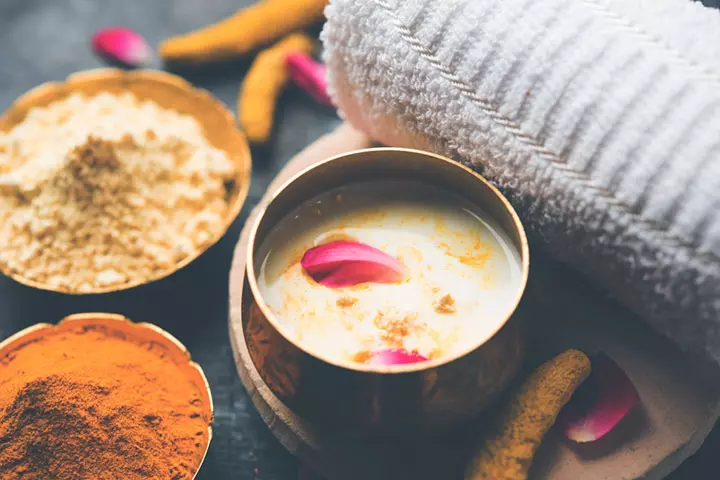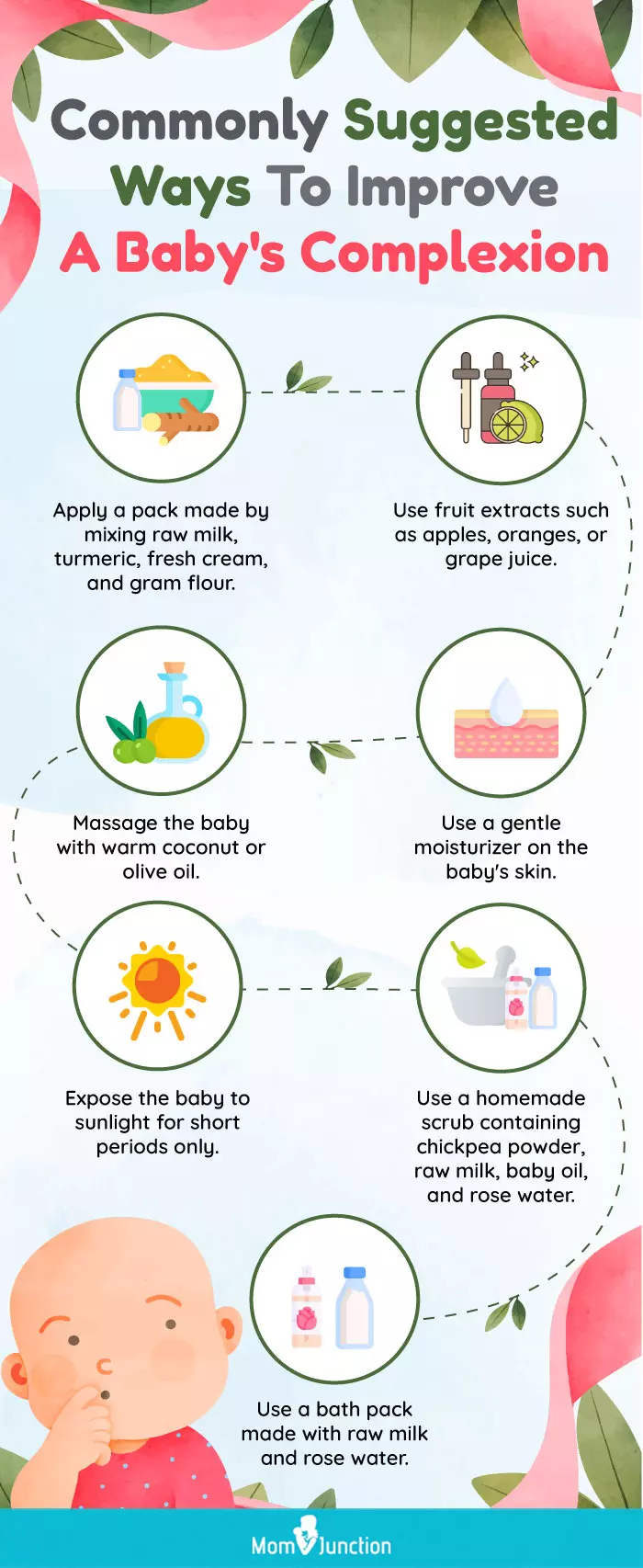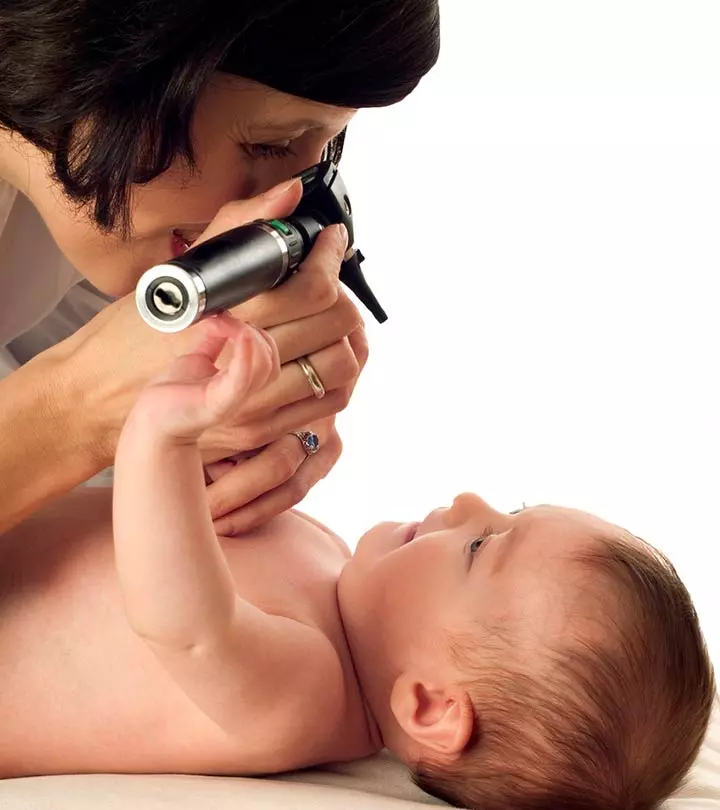
Shutterstock
Fair, wheatish, dark, or dusky, babies are a blessing irrespective of their skin color. A parent’s priority includes overseeing the baby’s growth, development, and overall well-being. However, sometimes, you might become anxious about your child’s complexion due to societal pressure and ponder how to make your baby’s skin fair.
You might have come across several remedies for improving the complexion of your child. But are they effective? This post gives you some natural tips on making your baby’s skin fair and also tells you if they work.
Key Pointers
- Consider using mild creams to keep the baby’s skin healthy, and avoid using harsh soaps and other chemical products.
- Make it a routine to use a broad-spectrum sunscreen with SPF 30 for the baby every day.
- Massage the baby’s skin with coconut oil to keep it nourished and soft.
- Daily limited sun exposure is considered beneficial for developing babies and can serve as a source of vitamin D.
Tips For Making Your Baby’s Skin Fair: Do They Work?
Dr. Naheed Ali, a physician from North Miami Beach, Florida, says, “There is no proven way to change a baby’s skin color or make it fair. A baby’s skin color is determined by genetics and cannot be changed through diet or other means. Any attempts to do so could potentially harm their health.
“Instead of trying to change the skin color, focus on keeping their skin healthy and protected from the sun. You may use a gentle, fragrance-free moisturizer, while avoiding harsh soaps or baby skin care products. Also, protect your baby’s skin from the sun using a broad-spectrum sunscreen with an SPF of at least 30 and avoid prolonged exposure to direct sunlight.”
Here are some natural and practical baby skin whitening tips for new parents:
1. Gram flour paste

A skin pack is made by mixing raw milk, turmeric, fresh cream, and gram flour. The thick paste is applied to the baby’s skin. After ten minutes, this pack is cleared with cotton or a soft cloth. However, make sure the ingredients are fresh and avoid applying excessive amounts or using the pack on sensitive areas of the baby’s skin.
Rationale: The use of raw milk and turmeric could be therapeutic to the skin (1). Also, this traditional Indian paste is said to give a glow to the skin. However, it cannot make the baby have a fair complexion (2).
 Do remember
Do remember2. Fruit sap
Did one of your visitors advise you to use natural fruit extracts to ‘improve the complexion? People usually recommend grape juice, apples or oranges to cleanse the baby.
Rationale: Plant extracts are found to be useful as anti-aging elements in adults but not in babies, who may also have the risk of ingesting them (3).
Note that fruit juices should not be fed to babies below six months. Doctors suggest breastmilk to be the only source of nutrition for infants during the first six months of life.
3. Oil massage

Traditionally, several countries use coconut or olive oil, which are commonly used oils for baby skin. Also, the oil should be warm and not hot. Apply soft pressure and gently rub the baby’s skin with the oil.
Rationale: Routine oil massaging helps in improved sleep for the baby. It can keep the baby’s skin hydrated, smooth and act as a skin barrier (4) if you are using uncontaminated and natural oils. But it doesn’t make the baby’s skin fair.
 Did you know?
Did you know?4. Mild body pack
A body pack is made with sandalwood paste, raw milk, turmeric, and saffron. It is applied to the baby’s body, and once dried, is wiped with a soft cloth. Always do a patch test first to ensure the baby’s skin isn’t sensitive to any ingredient.
Rationale: Though the ingredients are known to be skin-friendly, they cannot lighten the skin color or pigmentation.
5. Right bathing temperature

Any temperature of the water doesn’t change the skin color of the baby. However, the baby cannot withstand water that is too hot or too cold. Only lukewarm water should be used to wash your baby’s face and body. Avoid overbathing newborns and infants, as frequent bathing can lead to skin dryness (14).
6. Moisturizing
Babies have delicate skin. A gentle massage using a mild moisturizer, baby cream, or baby lotion on newborns three to four times a day can help.
Rationale: Moisturizing maintains skin hydration and prevents dryness. It soothes the baby’s skin but doesn’t change the skin color.
Experts from The Royal Children’s Hospital Melbourne recommend applying a thick, unscented moisturizer at least once a day to keep babies’ skin soft and prevent dryness.
7. A synchronized sunbath

Small amounts of daily exposure to sunlight is considered good for the baby. However, do not expose the baby’s skin excessively to the sun rays as it may tan or burn the skin and make it look dull.
Rationale: You can expose your baby to sunlight for vitamin D supplementation. However, it should be for only a few minutes early in the morning and at cooler times of the day. You should also know that the baby’s skin will not turn fairer with a sunbath (5).
 Quick fact
Quick fact8. Baby scrub
A homemade scrub is made by mixing chickpea powder, baby oil, raw milk, and rose water. The paste is applied to the baby’s skin and rubbed gently.
Rationale: The mixture could help in the exfoliation of unwanted impurities and remove light hair on the baby’s skin. But it won’t lighten the complexion. Also, if the powder is rough or is rubbed roughly, it could cause rashes.
9. Don’t use soap

A mild baby soap, specifically made for the baby’s sensitive skin, may be used on your infant. You may also make a homemade bath pack with raw milk and rose water. Apply the mixture on your baby’s skin and wash it off with lukewarm water.
Rationale: Mild soap is safe for the baby. However, harsh soap can lead to skin peeling and dryness. Neither the use of the soap nor its avoidance can give a fair complexion to the baby (6).
10. Baby wipes
You may use baby wipes that contain glyceriniA thick, sweet, and clear liquid used for making medicines, food, and soaps. and milk cream. These soft wipes help to cleanse your baby’s face and other body parts.
Rationale: Baby wipes are designed to clean your baby and avoid dryness. But they are not made to lighten the complexion.
What’s In The Complexion?
A baby’s complexion depends on their genes, family and, to an extent, on the climatic conditions of the place they live in. Skin is just like any other part of the body. If you are still wondering how to make your baby’s skin fair, it’s worth noting that no external applications can alter its natural color. All you can do is take care of the baby’s skin to keep it healthy and give it a glow.
Frequently Asked Questions
1. Does a baby’s complexion change after birth?
Skin maturation continues for the first two years of the baby’s life, leading to several changes in the skin color (10).
2. Why is my baby’s skin so white?
The white or pale appearance of the baby’s skin might indicate an underlying medical condition, such as anemia or albinism (11) (12).
3. Are black babies born lighter?
All babies, including black babies, appear red at birth due to their thin skin. As the thickness of the skin increases, it may begin to appear pink (10).
4. Can light-skin colored parents have a dark baby?
Yes. Light-skin colored parents may have a baby of color if any of the parents have recessive genes of dark skin (13).
5. What are the best products to keep my baby’s skin healthy?
Several brands make skincare products specially formulated for baby’s delicate skin. These baby skincare products may include baby moisturizers, creams, lotions, soaps, and oil. Make sure all these products are baby-friendly, fragrance-free, and free of harmful chemicals like paraben and phthalates. Avoid using any products without a pediatrician’s guidance, as some fairness products can increase the risk of skin issues and infections (15).
The societal preference toward light-skin tones might make you wonder, “How to make your baby’s skin fair?” Although several home remedies may increase the skin’s brightness, none reduces the skin tone. These remedies try to reduce the tan, which gives the perception of fair skin.
Although it is difficult not to cave into the societal acceptance of fair skin, remember there’s beauty and grace in every skin tone. Hence, try to shift the focus to accepting the skin tone in its true form. Instead of fair skin, you may focus on healthy, beautiful skin.
Infographic: Tips For Making Your Baby’s Skin Fair
Over the years, parents of newborn babies have been given a plethora of anecdotal advice on improving their baby’s complexion. However, it’s important to remember that the priority is to ensure your baby’s health and well-being. Every baby is beautiful in a unique way, no matter their skin color. The following infographic offers some tips passed down through the years. Take a look! Illustration: Momjunction Design Team

References
1. A. R. Vaughn, A. Branum, and R. K. Sivamani; Effects of turmeric (curcuma longa) on skin health: a systematic review of the clinical evidence; Phytotherapy Research (2016)
2. Indian Myths Explored; Sutter Health
3. Ivana Binic, et al., Skin ageing: Natural weapons and strategies; Evidence-based Complementary and Alternative Medicine
4. G. L. Darmstadt and S. K. Saha; Traditional practice of oil massage of neonates in Bangladesh; Centre for Health and Population Research (2002)
5. P. Meena et al.; Sunlight exposure and vitamin D status in breastfeed infants; Indian Pediatrics (2016)
6. Bathing your baby; Nationwide Children
7. The Biology of Skin Color; BioInteractive
8. Truc Le-Buu Pham et al.;Anti-Aging Effects of a Serum Based on Coconut Oil Combined with Deer Antler Stem Cell Extract on a Mouse Model of Skin Aging; NCBI (2022)
9. Ankur K. Jindal et al.;Sun Exposure in Children: Balancing the Benefits and Harms; NCBI (2020)
10. Marty O. Visscher et al.; Infant Skin Maturation: Preliminary Outcomes for Color and Biomechanical Properties; NCBI (2017)
11. Anemia caused by low iron – infants and toddlers; MedlinePlus
12. Albinism; NHS
13. Can a couple have a baby that is significantly darker or lighter than either individual?; The Tech Interactive
14. Washing your baby; Healthdirect Australia Limited
15. Hemal Shroff et al.,Skin Color, Cultural Capital, and Beauty Products: An Investigation of the Use of Skin Fairness Products in Mumbai, India; Frontiers in Public Health (2017)
Community Experiences
Join the conversation and become a part of our nurturing community! Share your stories, experiences, and insights to connect with fellow parents.
Read full bio of Jenni Johnson
- Dr. Naheed Ali has 18 years of experience in Holistic Health. He holds a Clinical Research Certification from The National Institutes of Health and a Lifestyle Medicine and Nutrition Certification from Harvard University.
 Dr. Naheed Ali has 18 years of experience in Holistic Health. He holds a Clinical Research Certification from The National Institutes of Health and a Lifestyle Medicine and Nutrition Certification from Harvard University.
Dr. Naheed Ali has 18 years of experience in Holistic Health. He holds a Clinical Research Certification from The National Institutes of Health and a Lifestyle Medicine and Nutrition Certification from Harvard University.
Read full bio of Swati Patwal
Read full bio of Rohit Garoo
Read full bio of Anindita Ghatak





















